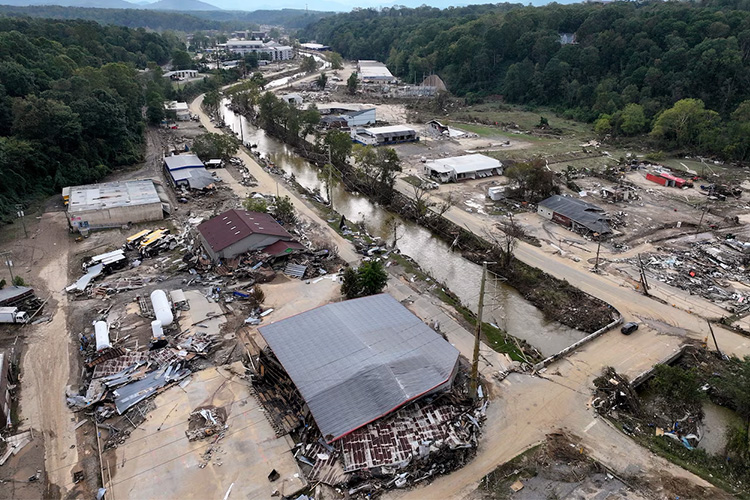
Hundreds of thousands of people lost homes and livelihoods during Hurricane Helene this fall. photo by Mario Tama
As the intensity and scope of natural disasters worsens, many communities all over the country are struggling to keep up.
Every year, multiple hurricanes make landfall in the United States. This fall, Hurricane Helene made history as the third most deadly hurricane in modern times, causing over $50 billion in damage according to early estimates. Many along the hurricane’s path have lost their homes or businesses, and life in the hardest-hit areas is still disrupted. Helene first made landfall on Florida’s western coast as a Category 4 hurricane, but quickly moved inward toward the Appalachian Mountains. Here, the true destructive potential of the hurricane would be felt.
Asheville, North Carolina experienced some of the worst effects of the hurricane. In the days leading up to Helene’s arrival, Asheville and many other mountain towns in the region had experienced days of rainfall, which saturated the ground and primed it for the floods and fallen trees that would cause immense amounts of destruction. Many residents of Asheville didn’t realize that the storm would be as intense as it ended up becoming. Susan and Lowell Grabel are two such residents. As Susan said, “We knew a bad storm was coming… [but] we don’t live near the river so we were not advised to evacuate.”
The aftermath of the storm, however, was devastating. Many rivers in the Appalachian Mountains flooded, and the United States Geological Survey reported around 2,000 landslides that took place. Lowell described this, saying, “There are so many places that the road’s gone… or homes are washed away.” Many people in Asheville and surrounding areas are now homeless because of the storm. The River Arts District, the widely-celebrated home to hundreds of local artists, was hit especially hard. Many small shops have been put out of business, and even a partial recovery will take many years. Asheville residents lost power, water, and internet, and cell service in the weeks after the storm, so there were few to no available communications available to most people. Many Asheville residents were without water for nearly two months due to the storm’s effects on Asheville’s reservoir, which provides water to around 80% of the town. According to Lowell, “The turbidity of the water is so high that it isn’t drinkable.” Fortunately, drinking water was restored to Asheville on November 18th.
Many relief organizations quickly sprang into action. Volunteers from across the country headed to areas affected by the hurricane to provide aid. FEMA—the Federal Emergency Management Agency, the US government’s disaster response agency—arrived to assist in the recovery after the hurricane, including helping people get temporary housing, providing support for those without essential utilities, and assisting in repairing damaged homes and buildings. Restaurants all across Asheville opened their doors to provide food to those without electricity or water at home. However, false rumors and conspiracy theories soon started to spread about the relief efforts after Hurricane Helene. These rumors, which include claims that the government is not doing anything to help survivors of the hurricane, or that relief organizations are intentionally skipping damaged houses because of who the residents voted for, are false and can hinder relief efforts. These conspiracies were very disturbing to the Grabels and many other Asheville residents, since they primarily came from, according to Lowell, “people that are not here, that don’t know what’s going on.”
In the aftermath of the hurricane, many are still struggling to cope with the devastation and loss they experienced. As Susan explained, “We just don’t think we have the emotional resources.” Asheville and the many other areas affected by the hurricane will need a lot of help to recover. According to the Grabels, the best way for those concerned to help is to support local businesses, many of whom will not be able to survive the next few years. There is good news, though. In the wake of devastating disasters such as these, communities band together and support each other. While these feelings in no way negate the devastation caused by the hurricane, Susan said that “people come through in these kinds of tragedies and help each other out and that’s a good feeling.”